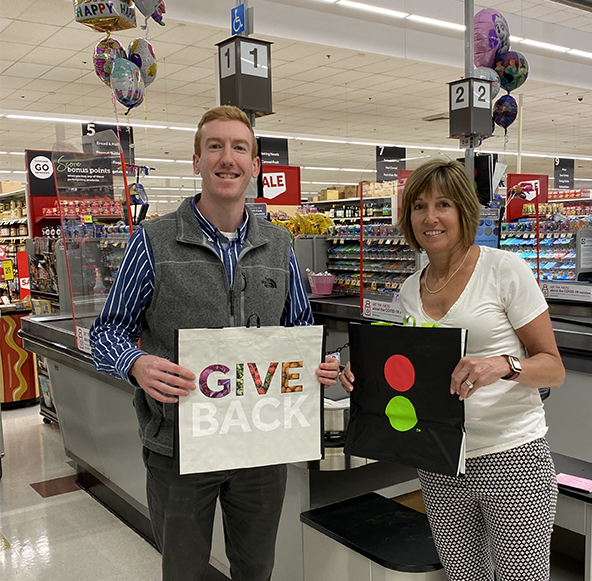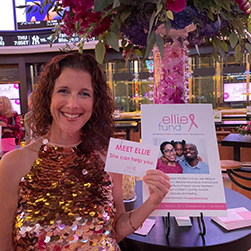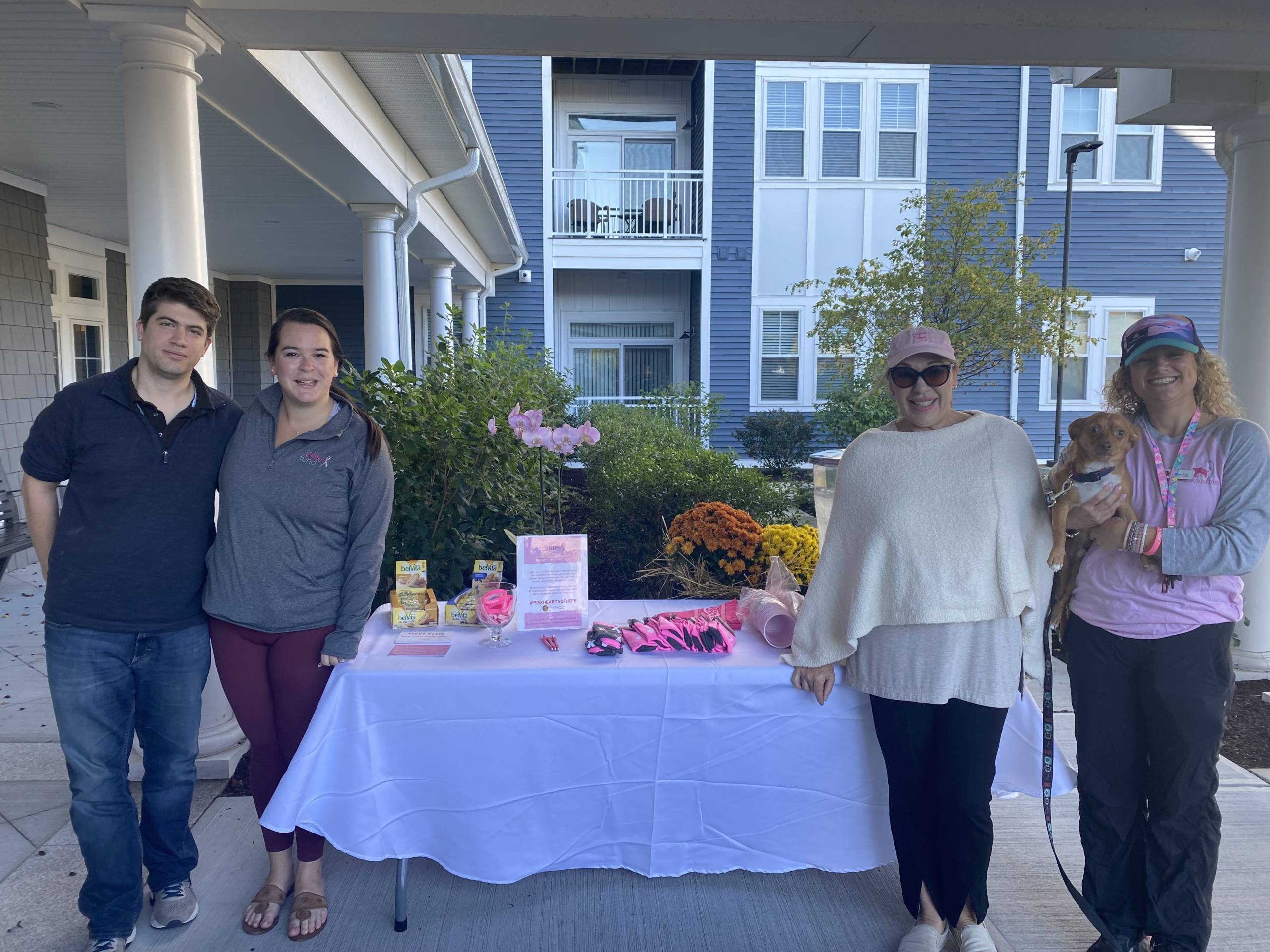A breast cancer diagnosis delivers the one-two punch of financial and emotional instability. Executive Director Meredith Mendelson explains how the Ellie Fund eases both burdens. Stop & Shop has supported the Ellie Fund through the Community Bag Program.
Tell us about the Ellie Fund.
We were founded in 1995 by two sons, Jeff and Eliot Popkin, who unfortunately lost their mom to metastatic breast cancer. She had lived with this disease for many years, which was really unusual in the 80s. It was a very difficult time for them, but they were very thankful for the assistance they received from people. They wanted other families to have the same support. And so, they started, really grassroots, selling t-shirts and running races and raising money in memory of their mom, Ellie, and that’s the Ellie Fund, named for Eleanor Popkin. It’s a much different organization now 25 years later.
But our mission is really the same and that’s to reduce emotional and financial stress associated with really debilitating and sometimes life-threatening disease so that our patients can focus on what matters most, which is their recovery. They shouldn’t be thinking about how they’re going to get groceries and food on the table for their families.
They should be thinking about their treatment, how to best be ready for the next treatment, so they can heal. Our mission is basic. It’s just to get the patients to ratchet down levels of stress so they can focus on what really matters, their healing and their family.
What sets your organization apart from others in your community?
I think, for me, what sets apart the Ellie Fund from other organizations, and I really can only speak to the breast cancer world in this question, is that we do not require any proof of financial need.
We don’t ask patients for their taxes or their financial statements. That’s a lot, to go back and dig through your taxes when you’re dealing with a new diagnosis. If someone says we can help you, but can you prove that you need it? It just adds insult to injury. We never have turned away anyone for having too much money or having not enough money. If you have breast cancer, you need something. Even though we don’t ask for proof of financial need, I would say more than half of our patients have household incomes of $50,000 or less.
For some of our patients it’s truly treatment versus food, or medicine versus groceries.
Some of our patients are fully insured, fully employed but a breast cancer diagnosis hits really hard and really fast financially. It’s the second highest cause of bankruptcy among cancer patients. If you think about the fact that 50% of Americans can’t afford a $400 emergency expense, and you must pay for the deductibles, the copayments and maybe short-term or long-term disability doesn’t kick in for six months, it just can wipe out a household.
We do not require proof of residency beyond that the patient is being treated in Massachusetts or resides here. For underserved families, in many of the cities where Stop and Shop serves customers, there are families that need help, who are afraid to ask for help. Imagine all those things stacked against you and then a breast cancer diagnosis.
We serve men and women, but the majority of our patients are women. You knock a woman out of their household income and their household functioning, and the whole family goes down. For some of our patients it’s truly treatment versus food or medicine versus groceries. It can be dire.
For other patients, it’s just that nobody saves money for breast cancer. You save for all the right milestones, but you don’t save for that. It can derail anyone. On the emotional side, it doesn’t matter what you have or what you don’t have. It is a major blow to your household, to your sense of stability. It’s just a very emotional disease.
Tell us a story that clearly illustrates the good work you are doing.
Another thing about our patients is that a very high percentage of them self-describe as single. Imagine going through this alone. Recently, we had a patient that came through the South Cove Community Health Center in Quincy, which serves almost exclusively Asian-American or Asian patients. She was a 67-year-old woman who did not speak any English, lived in Quincy and was being treated at a Boston hospital.
You can imagine how scary this was for her. First of all, she’s getting 18 treatments of radiation. There’s no easy way to get from Quincy to Brookline, and the only solution she had was to take the train. We were told she was really considering not treating it because she just didn’t know how to get there.
We have great relationships with the doctors at South Cove, and there’s an incredible social worker there that we work with. She said that we’ve got to find this woman a driver who speaks Mandarin. We were texting people that we heard were Uber drivers. We were calling friends whose parents spoke Mandarin, who might be retired, who might be willing to help. We pulled out all the stops.
We found a driver who was willing to help us and who spoke Mandarin, a really nice gentleman. He lives in Boston, and he went every day for 18 days to Quincy to pick up our patient. He took her to the hospital, waited outside the hospital while she received treatment and then drove her home to Quincy. Imagine choosing between treatment and not treatment because you’re overwhelmed by the logistics. And during the pandemic, it’s only worse because not only is it hard, but it also isn’t safe for an immune-compromised patient to be on the train.
What are your most essential services?
There are wonderful food banks and resources in Massachusetts, but it’s not safe for our patients to be on line at a food bank, so our most used service is the grocery gift cards. We provided patients with $669,800 in grocery gift cards last year. And we would do more, we want to do more because we’re only serving about a thousand patients and there are 7,000 new diagnoses every year in Massachusetts alone.
We let our patients pick where they want to shop, and there’s a huge sense of dignity in choice. They can buy culturally appropriate foods. They can send a neighbor and not ask their neighbor to buy the groceries. We want to keep things as normal as possible when nothing’s normal.
In addition to transportation and groceries, our most utilized service is childcare. We pay up to 50% of someone’s childcare, which is extraordinary. I don’t know anyone else who does that.
But there’s just more work to be done. We’re not satisfied. We have a program that works, we can prove it, but we need more patients. And we need more money to help more patients because we know what we’re doing works.
What is your greatest achievement or contribution to the community?
I think that our ability to understand the emotional needs during the patient treatment journey is unique. It’s very hard for patients, women specifically, to ask for help. And we come in understanding, after 26 years of serving patients, what that treatment looks like, when they might need help the most, how long it could possibly last with limited resources.
I think that our ability to understand the emotional needs during the patient treatment journey is unique.
Staying in our lane in terms of the patient treatment journey is really important and what we do well, but equally important was that we were able to pivot during Covid. The pandemic showed us that the systems that were sending us patients pre-pandemic are not foolproof. And we were missing thousands of people that don’t get to the major hospitals. I’m most proud that we saw a blind spot in our own practice. And we said, “This is not okay. Where are the rest of the patients?” We understood where our vulnerability was and just owned it. We don’t do a good enough job at and with the community health centers, and we must. With our incredible team including cancer survivors and caregivers, that you must have in order to be in this business, we will.
Of course, just by the nature of who we are, we do a lot of education and advocacy, but we really focus on what does life look like for a patient during three to six months of treatment.
What are the most important things you want people to know about the Ellie Fund?
First and foremost, we are a statewide organization; the money that comes in from Massachusetts stays in Massachusetts. And I think that’s really important to people when they’re deciding where to put their philanthropic priorities, because there are so many amazing causes out there.
But at Ellie Fund we’re very focused on households and families and at the crux of all of that is always going to be food. This is a disease that affects an entire household, especially because it’s the mom. Women’s lives are already so complicated. Then you add a breast cancer diagnosis and something as simple as a meal can be totally insurmountable.

For anyone who’s interested, perhaps you don’t have extraordinary amounts of money to give, but you want to give where it has a huge impact. We make money we receive go a long way.
We value our partnerships with Stop and Shop and we’re also customers. It’s a partnership where customers are giving back. We want warm introductions to the people who need us and grocery stores are and can be a source for us. You can find community unity right there at your grocery store. Store managers and customers can be super powerful in helping us find patients that don’t know about us.
I would ask Stop and Shop customers to do two things. They can support us through the Community Bag and Bloomin’ 4 Good programs so that we can bring on the next patient who’s waiting for us out there right now. And they can also help us find patients in their own communities and direct them to us.
How did you hear about the Stop and Shop Bloomin’ 4 Good and Community Bag programs?
It’s been a while now. We believe in the power of local communities and grocery stores are a major part of that. Grocery stores are really a great way to get broader reach to people because everybody shops for groceries. Two women I work with learned of the program at their local grocery stores and contacted Stop and Shop. We thought it was a great fit with our own work and submitted an application for consideration. We’ve benefited from the program since December 2020.
How are you using the funds you’ve received from these programs?
The majority of our funds go to feeding families, then transporting patients to treatment and helping to pay for childcare. Mom or dad can go to treatment and know their kids are in a safe environment. With a cancer diagnosis and the financial toxicity it brings, after-care is one of the first things families will forego. During the pandemic when schools were closed, we were able to pay for tutors to come in and monitor the remote learning while mom or dad went for treatment. We just adapted and will continue to.

